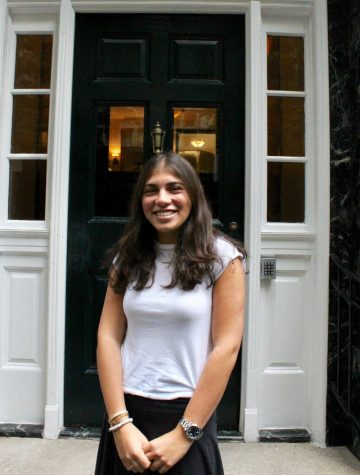A New Day for Student-Teacher Conferences
Unlike previous years, this year, student-teacher conferences took place on Thursday, not Friday. Rabbi Dov Pianko said that the purpose of the switch was “to try and eliminate the mentality of students rushing through all of their teachers. I always vote for students to have a more chill experience.” The switch, however, received mixed reviews from the students. “I felt like there was just too much time given for conferences. I would have much prefered to have been able to leave school when I finished like last year, rather than wait around for my last two classes,” said Gabi Potter ’20. Roni Denti ’20 disagreed with Potter and actually preferred the change. “I did not feel as rushed to finish all my meeting and also definitely noticed a decrease in cutting on the lines, because student knew there was no rush to leave school,” said Denti.
Whether student-teacher conferences are actually helpful is another question in and of itself. Students who actually need to meet with their teachers can use this as their chance to do so, but others feel as though they are just waiting on lines to hear the same thing from each teacher: “You’re doing so well!” or “Keep up the good work!”. Freshman Izzie Ottensoser ’22 said, “Although it was a little overwhelming and disorganized I actually thought conferences were really helpful. It’s always hard to find a time to meet with certain teachers that works for both the teacher and myself, so I used this to my advantage.” Caroline Schwartz ’22 agreed, adding, “It was nice to hear advice from teachers, even if it was just telling me to keep on doing the same thing.” Ben Silverman ’20 disagreed with Schwartz and Ottensoser, stating, “I hear the same thing every year and found that I spent more of my time just waiting on lines than actually meeting with teacher.” Yola Ashkenazie ’20, who was away during conferences this year, said,“I did not realize how much I actually enjoy and benefit from conferences until I missed it this year. Now, I am struggling to find convenient times to meet with my teachers.”
Another change that occurred during this years conferences was that seniors had to attend. Although many teachers just signed the seniors’ papers and did not actually meet with them, they still had to come into school because senior pictures were also being taken that day. “It was just inconvenient. I ended up barely meeting with any of my teachers, and those I did meet with didn’t tell me anything I didn’t already know. I had to come to school though because of the [senior] pictures, but otherwise I probably would have considered not even showing up,” said Alexa Polinsky ‘19. Rabbi Slomnicki said the purpose of having senior pictures on this day was “To eliminate senior pictures of interrupting regular class days. It had nothing to do with seniors ditching.”
As per usual, students debated amongst themselves which teachers line was the longest. “I waited on Dr. Jucovy’s line for over an hour,” said Charles Spielfogel ’21. “Ms. Newman’s line was definitely the longest,” said Emma Stonehill ‘21. “I lost my spot on Rabbi Schimmel’s line about three times, so I definitely spent the most time on that line” said Gabby Schwartz ’20. Almost all students can agree that the school could do a better job organizing conferences so that teacher-lines are no unnecessarily long.
“What I thought was really helpful was something that Dr. Bernstein did. Before conferences he sent out an email to all his students and you were able to sign up for a specific time slot. This was really good because it eliminated an entire line for me and I was able to just come to him when it was my turn to meet,” said Aliza Freilich ‘20.
Although students do seem to enjoy having the opportunity to meet with their teachers, most agree that the school could do a better job ensuring that conferences are as efficient as possible.

Before she became Layout Editor of The Rampage, Hannah Doft was an active writer for the newspaper since her freshman year at Ramaz. Other than The Rampage,...



